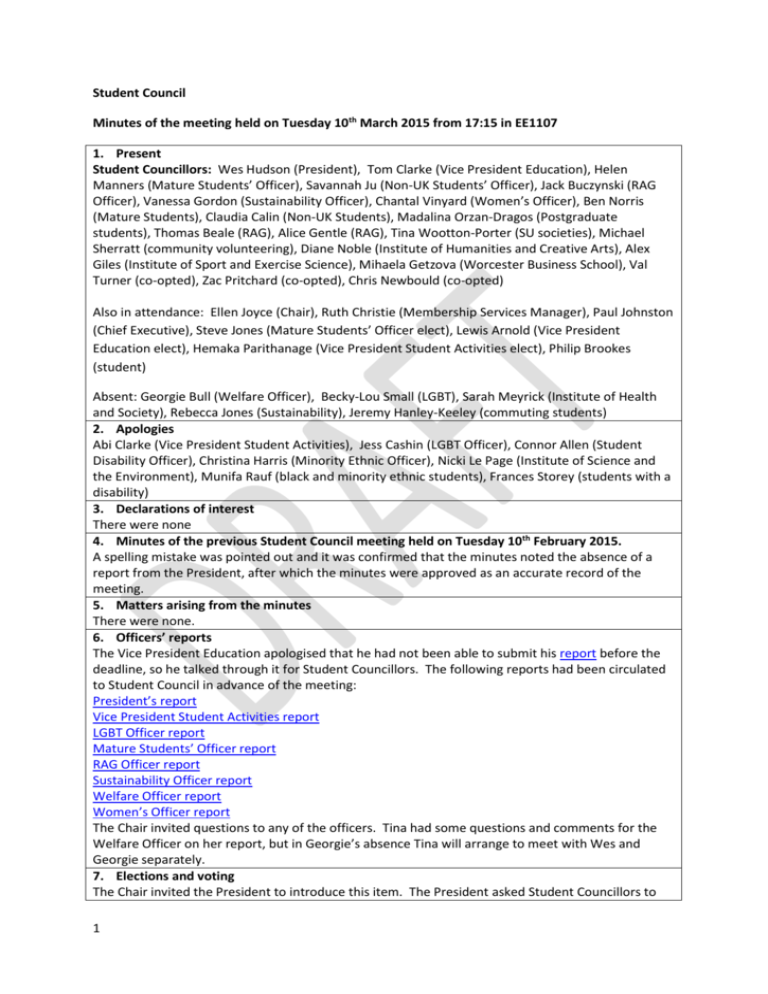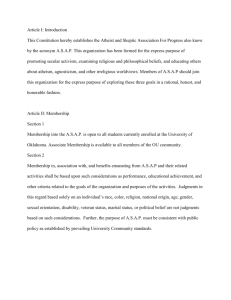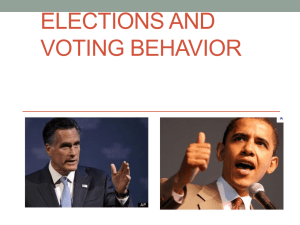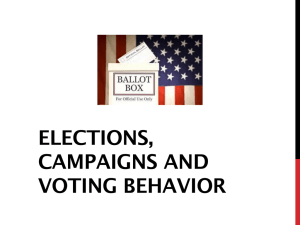DRAFT Student Council Minutes of the meeting held on Tuesday 10
advertisement

Student Council Minutes of the meeting held on Tuesday 10th March 2015 from 17:15 in EE1107 1. Present Student Councillors: Wes Hudson (President), Tom Clarke (Vice President Education), Helen Manners (Mature Students’ Officer), Savannah Ju (Non-UK Students’ Officer), Jack Buczynski (RAG Officer), Vanessa Gordon (Sustainability Officer), Chantal Vinyard (Women’s Officer), Ben Norris (Mature Students), Claudia Calin (Non-UK Students), Madalina Orzan-Dragos (Postgraduate students), Thomas Beale (RAG), Alice Gentle (RAG), Tina Wootton-Porter (SU societies), Michael Sherratt (community volunteering), Diane Noble (Institute of Humanities and Creative Arts), Alex Giles (Institute of Sport and Exercise Science), Mihaela Getzova (Worcester Business School), Val Turner (co-opted), Zac Pritchard (co-opted), Chris Newbould (co-opted) Also in attendance: Ellen Joyce (Chair), Ruth Christie (Membership Services Manager), Paul Johnston (Chief Executive), Steve Jones (Mature Students’ Officer elect), Lewis Arnold (Vice President Education elect), Hemaka Parithanage (Vice President Student Activities elect), Philip Brookes (student) Absent: Georgie Bull (Welfare Officer), Becky-Lou Small (LGBT), Sarah Meyrick (Institute of Health and Society), Rebecca Jones (Sustainability), Jeremy Hanley-Keeley (commuting students) 2. Apologies Abi Clarke (Vice President Student Activities), Jess Cashin (LGBT Officer), Connor Allen (Student Disability Officer), Christina Harris (Minority Ethnic Officer), Nicki Le Page (Institute of Science and the Environment), Munifa Rauf (black and minority ethnic students), Frances Storey (students with a disability) 3. Declarations of interest There were none 4. Minutes of the previous Student Council meeting held on Tuesday 10th February 2015. A spelling mistake was pointed out and it was confirmed that the minutes noted the absence of a report from the President, after which the minutes were approved as an accurate record of the meeting. 5. Matters arising from the minutes There were none. 6. Officers’ reports The Vice President Education apologised that he had not been able to submit his report before the deadline, so he talked through it for Student Councillors. The following reports had been circulated to Student Council in advance of the meeting: President’s report Vice President Student Activities report LGBT Officer report Mature Students’ Officer report RAG Officer report Sustainability Officer report Welfare Officer report Women’s Officer report The Chair invited questions to any of the officers. Tina had some questions and comments for the Welfare Officer on her report, but in Georgie’s absence Tina will arrange to meet with Wes and Georgie separately. 7. Elections and voting The Chair invited the President to introduce this item. The President asked Student Councillors to 1 suggest how the number of voters might be increased. The following comments and suggestions were made: Volunteers and candidates need to be at City campus, Riverside and the Garage to raise awareness of the elections and encourage students based there to vote Promotion of the elections should start much earlier in the year. At Manchester SU, for example, staff wear T-shirts promoting the opportunities to stand for election and to vote from the beginning of the year Information about the elections should be installed on desk tops across the University (this may be problematic as the election period coincides with promotion of the NSS) The SU and candidates should have a presence in Main Reception – there’s much greater footfall there than in the SU building The SU should ask for help from the University’s Communications team to promote the elections Candidates themselves should plan their campaigns in advance of nominations closing The campaigning period should be extended to achieve a better reach Hustings should take place before voting opens One of the hustings should take place in the Pear Tree to involve students who happen to be there anyway The timing of the elections period should be altered to a time when fewer students are out on placement (it was pointed out that it is impossible to find a time when no students are on placement) More needs to be done to encourage lecturers to promote the elections and to allow candidates to speak to students – many emails from candidates asking permission to visit classes were unanswered Students are generally apathetic – one Student Councillor reported that he knows he is the only person from two years of his course to complete the University’s student survey, for instance Another Student Councillor reported that her class were given time out of a seminar to use a computer room to complete the NSS Some lecturers plan their lectures so precisely that they would not be able to accommodate talks from candidates 8. By-election A discussion document has already been circulated to Student Council. The decision to be taken is whether a by-election for the unfilled part-time officer positions should run this month, with nominations opening tomorrow, Wednesday 11th March 2015, or whether this should be postponed until the new academic year (early October 2015). The Chair invited Student Councillors to discuss the options. The following comments were made: It is a good idea to run the by-election now, on the back of the main elections If we postpone the by-election until October, awareness can be raised right from the start of induction week We have to acknowledge that it may be difficult to attract candidates for all of the remaining positions now Filling the positions at this time of year would allow part-time officers to access training, conferences etc over the summer At this time of year, students have so many other demands on their time that they may feel they can’t commit to campaigning, even if they’re keen to stand for election It would be preferable to separate the election of full-time officers from the election of parttime officers, with the latter taking place in the new academic year. This would also allow firstyear students to stand as candidates A lot of work needs to be done to put the groundwork in to promote the democratic process It needs to be embedded in the culture. The summer months can be used by current part-time officers to prepare to hand over the role. Splitting part-time officer elections from full-time 2 officer elections would be beneficial The nominations process needs to be more transparent Running a by-election now may result in a very low number of both candidates and voters. Enthusiasm wanes over the year and students will now be focusing on their assignments If the election is postponed until the autumn there will be more chance to work on a different approach to raise awareness If the election is fairly early in October, most placement students will still be at University If part-time officers are elected in October, they may be more likely to consider standing for fulltime positions Students don’t understand what the roles are – there needs to be better information on the website Perhaps officers’ blogs and/or officers’ handbooks would help to raise awareness and the profile of what officers actually do Mature students don’t see how the SU can contribute to their University life It would be great to embed the elections in Freshers’ week More should be done to help students understand from the outset that representation and the democratic process are core to what the SU is all about Students still don’t understand that the SU is separate from the University. Could we have stories on the website which would help explain what the SU does? It would be a massive job for the new officers to promote the elections Having elections in October would provide the full-time officers with a great opportunity to lead from the front and increase their visibility The number of candidates is likely to be higher in the autumn than at this time of year Having to register to vote puts students off – it’s much easier to vote using the iPads There should be a link to vote on the SOLE page Paul explained that, even if students register on the SU website early in the year, they often forget their log-in between then and March if they don’t use the website regularly. Having attended iPads does away with the need for students to register. The best solution would be for the University to agree to having a single log-in for both SOLE and the SU website. This is an ongoing discussion. It’s really important for the SU that students engage with the democratic process – the more voters we have, the stronger the mandate and the more powerful our voice when we stand up to the University. We are hopeful that the academic registrar will agree to the single log-in. Paul made it clear that all Student Council is being asked to decide at this stage is whether the byelection should be held in March 2015 or October 2015. A decision about whether the part-time officer elections and the full-time officer elections should be held at different times of year from now on will need to be considered by Student Council separately at a later date. The Chair then tested the Turning Point voting system to make sure that all Student Councillors understood how it works. Student Councillors were then asked to vote on the question: Should the by-election take place this semester? The votes were as follows: A. B. C. Yes No Abstain Student Councillors were then asked to vote on the question: 3 5 votes 15 votes 0 votes Should the by-election take place in early October 2015? The votes were as follows: A. B. C. Yes No Abstain 19 votes 1 vote 0 votes The by-election for the following positions will therefore take place in October 2015: LGBT Officer Minority Ethnic Officer RAG Officer Student Disability Officer Sustainability Officer Welfare Officer Women’s Officer Chair of Student Council 9. Approval of clubs and societies Student Councillors were asked to decide if the following new student societies should be approved: Worcester Enterprise Society Yes No Abstain 18 votes 1 vote 1 vote Worcester Students Ethnic Group Society Yes No Abstain 17 votes 1 vote 2 votes Both of the above societies have therefore been approved. 10. I Heart Consent The Women’s Officer explained that Worcester is one of only 20 SUs which were successful in applying to be part of a pilot scheme. Together with the NUS Women’s Officer, Susuana Antubam, Chantal delivered a workshop yesterday (9th March) for people interested in running “Consent” workshops for groups of students. 15 attended – a mixture of staff and students. Student Councillors were invited to ask questions or to comment and a discussion followed: It was a really enjoyable session I had a question about why the session was so biased against men, which I didn’t feel was answered The reason the training is biased is because the numbers are – women are far more likely to suffer sexual assault and rape than men are Having worked with victims of sexual abuse, I can confirm that the likely repeat victims are overwhelmingly women. To illustrate the point, most people understand that men can get breast cancer, but the emphasis in terms of research and support is on women with breast cancer as they’re far more likely to suffer from breast cancer than are men NUS events and training do sometimes give the impression that they believe that all men are bad It’s difficult to engage men if they feel alienated or victimised If the SU is to deliver this kind of training, it’s helpful to explain right at the start why the emphasis of the conversation is on women as the most likely survivors and men as the most 4 likely perpetrators of sexual assault, so that people understand from the beginning It would be good to build training on these issues into committee training and StARs training in the next academic year Chantal emphasised that what she sees as important is to open up a conversation about consent, rather than lecturing people about it. It would be good to work in conjunction with relevant specialist academic staff to put together some sessions – more will be done on this after Easter The Women’s Officer also reminded Student Council that feedback is welcome on the draft “Zero Tolerance” policy. 11. Any other business Zac asked what progress had been made on the motion passed at last Student Council regarding cuts to the Access to Learning Fund (ALF). Paul reported that he approached the Head of Student Services, Caryn Thorogood and asked if she could provide relevant data. Caryn provided the following information: 1. How much money was allocated to ALF in year 2013/14? £279,623 2. How much money has been allocated for ALF in 2014/15? £280,000 3. How much was paid out in 2013/14 to the end of January 2014? £94,225 4. How much was paid out in 2014/15 to the end of January 2015? £115,800 5. What was the average pay out for each year to end of January for each year? £624 for 13/14 and £821 for 14/15 6. Are there any plans to alter the amount allocated to ALF in year 2015/16 and subsequent years? Yes, The Access Agreement for 2015/16 announced plans to significantly increase the amount of money allocated to the Access To Learning Fund. Savannah reported that Language Cafés, run by students, will begin on Monday 16th March. Everyone is welcome to come along and drinks and biscuits will be provided: Mondays: French 17:00 – 18:00 in EE1104 Tuesdays: Spanish 17:00 – 18:30 in HB1001 Wednesdays: Mandarin 17:00 – 18:30 in PN1014 Zac informed Student Council that there is to be a national demonstration against racism and fascism in London on Saturday 21st March organised by Stand Up To Racism. For further information, see http://www.standuptoracism.org.uk/ 12. Date of the next meeting In order to avoid clashing with NUS National Conference, the next meeting of Student Council will be held on Tuesday 14th April - please note this change of date. 5







